The Tennessee lease agreement serves as documentation to solidify a rental arrangement of a residence to protect the interest of the landlord and tenant. Before executing the register, both parties have an opportunity to fine-tune the conditions of the contract. Once in agreement, all involved individuals can sign and initial where necessary to finalize the paperwork.
Lease Agreements By Type
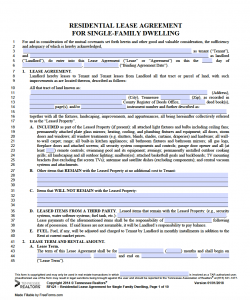 Association of Realtors Version – Tennessee’s regional realtor organization provides citizens with a lease agreement made for residential dwellings.
Association of Realtors Version – Tennessee’s regional realtor organization provides citizens with a lease agreement made for residential dwellings.
Download: PDF
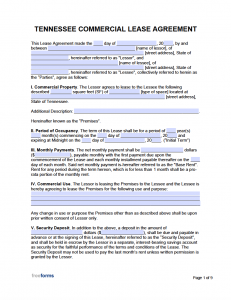 Commercial Lease Agreement – An express filing applicable to the renting of a unit for business usage.
Commercial Lease Agreement – An express filing applicable to the renting of a unit for business usage.
Download: PDF, Word (.docx)
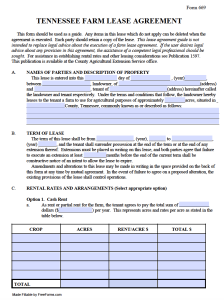 Farm Lease Agreement – A rental contract that is specific to the leasing of farmland.
Farm Lease Agreement – A rental contract that is specific to the leasing of farmland.
Download: PDF
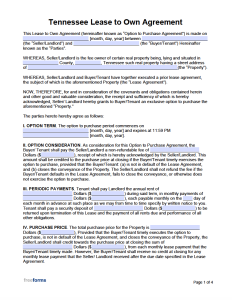 Lease to Own Agreement – Generates a format to cover the provisions of a rental of a building with a chance to buy upon the termination of the lease term.
Lease to Own Agreement – Generates a format to cover the provisions of a rental of a building with a chance to buy upon the termination of the lease term.
Download: PDF, Word (.docx)
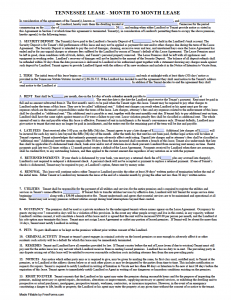 Month-to-Month Lease – The document incorporated to document the letting of an estate for a particular amount of time with an option to opt-out with thirty (30) days of advance communication of a desire to terminate.
Month-to-Month Lease – The document incorporated to document the letting of an estate for a particular amount of time with an option to opt-out with thirty (30) days of advance communication of a desire to terminate.
Download: PDF
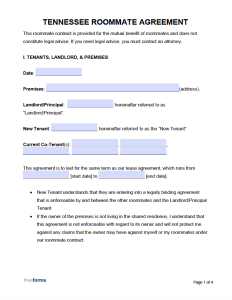 Roommate Agreement – Realizes the accord of an individual to rent a portion of a home and shared areas for a monthly stipend for a secured length of time.
Roommate Agreement – Realizes the accord of an individual to rent a portion of a home and shared areas for a monthly stipend for a secured length of time.
Download: PDF, Word (.docx)
Standard Lease Agreement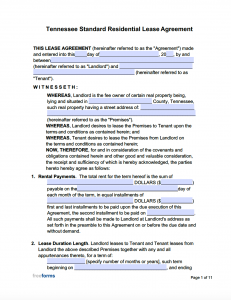 – Details the components of an arrangement to lease a dwelling for a specified period of time and dollar amount.
– Details the components of an arrangement to lease a dwelling for a specified period of time and dollar amount.
Download: PDF, Word (.docx)
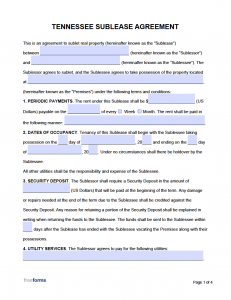 Sublease Agreement – A lease arrangement for a dwelling where a present tenant is to lease the residence to another individual.
Sublease Agreement – A lease arrangement for a dwelling where a present tenant is to lease the residence to another individual.
Download: PDF, Word (.docx)
Additional Forms
Application to Amend Lease – Tenants may use this form to request that an amendment be made to the original lease agreement (the landlord has the final say as to whether or not they will accept the submission).
Landlord-Tenant Laws
A summation of all mandated regulation on residential rentals can be made available in the Tennessee Uniform Residential Landlord and Tenant Act (§ 66-28-101 – 66-28-521).
Required Landlord Disclosures
Identification of the Landlord or Authorized Personel (§ 66-28-302) – The names and addresses for the owner of the property must be appropriately divulged in the written lease agreement. Any authorized official serving to manage any required action for maintenance on the premises should be listed as well.
Lead-Based Paint (42 U.S. Code § 4852d) – Buildings that have been constructed before 1978 may pose a hazard to any tenant residing on the property because of the possibility of on-site lead-compound paint. Literature disclosing the information on the hazardous impact of exposure should be included within the leasing document.
Property Showings During Tenancy (§ 66-28-403) – To showcase the unit for future tenants during the current tenancy, a clause allowing for entry must be defined in the lease agreement. The landlord must follow regulation to permit the entrance of potential new tenants only during the last month before the lease end and only with 24 hours advance notice.
When is Rent Late?
According to the Tennessee Code on residential rentals, rent is confirmed as late when it is not paid five days after the due date has passed. This 5-day grace period is extended to the next day should it fall on a Sunday or legal holiday (§ 66-28-201).
Late Fees
The maximum amount that a landlord can charge is 10% of the monthly rental amount owed. This is also subject to a commitment by inclusion in the lease agreement to be rightfully requested (§ 66-28-201).
NSF Checks
Ruling statutes demand that the fee for an inadequate balance and subsequently returned check not to exceed $30 in charges for the tenant. The amount must be clarified in the lease and acknowledged by the tenant with a corresponding signature to be valid (§ 47-29-102).
Security Deposit Maximum
There is no current law citing a maximum sum a landlord can charge as a security deposit on the property. A receipt upon payment of a security deposit is not necessitated by law but strongly recommended (§ 66-28-301).
Security Deposit Return
Once the lease has terminated, and the tenant has ultimately left the property, the owner has thirty (30) days to send a check for the deposit amount to the former tenant. Should the landlord rerent the space, the landlord will have seven days from the new tenancy start date to reimburse the previous tenant of the security deposit. In place of the full deposit, the landlord can instead send an itemized list of any damages and/or owed rent and subtract from the deposit amount, furnishing the tenant with the remainder. (§ 66-28-301)
Landlord’s Entry
The owner or managing agent has the right to enter the property for emergency purposes immediately with no required written advance announcement. For regular maintenance reasons, notice ahead of time is not required by law, although the twenty-four (24) hour notification is a generally accepted practice (§ 66-28-403).


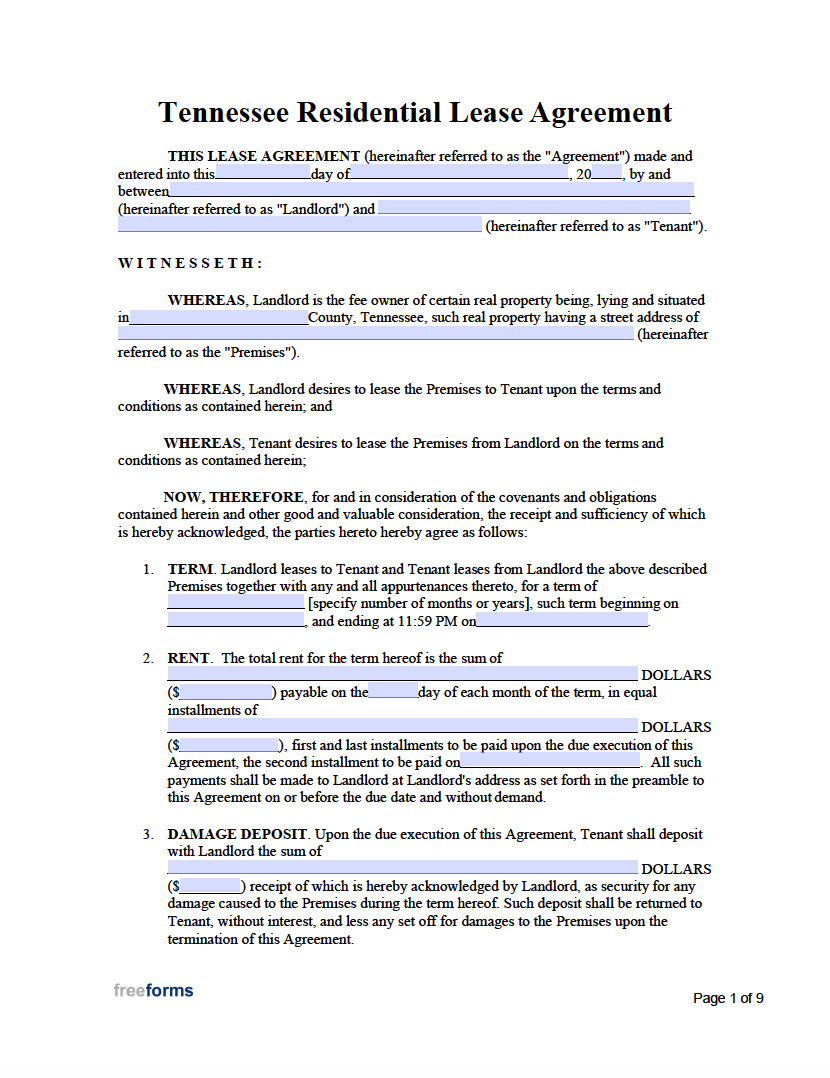
0 comments
Comments are closed.